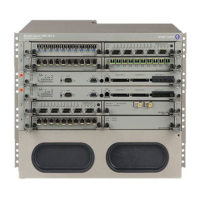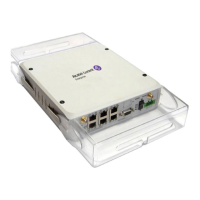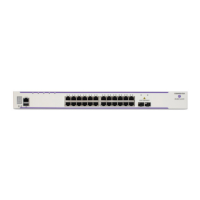VPRN Service Configuration Commands
Page 1038 7750 SR OS Services Guide
cc-type .sap-net, .net-sap]
cc-id 0 — 4094
lag-id lag-id
lag keyword
id 1 — 200
qtag1 0 — 4094
qtag2 *, 0 — 4094
vpi NNI 0 — 4095
UNI 0 — 255
vci 1, 2, 5 — 65535
dlci 16 — 1022
policy
Syntax [no] policy vrrp-policy-id
Context config>service>vprn>sub-if>grp-if>srrp
Description This command associates one or more VRRP policies with the SRRP instance. A VRRP policy is a
collection of connectivity and verification tests used to manipulate the in-use priorities of VRRP and
SRRP instances. A VRRP policy can test the link state of ports, ping IP hosts, discover the existence
of routes in the routing table or the ability to reach L2 hosts. When one or more of these tests fail, the
VRRP policy has the option of decrementing or setting an explicit value for the in-use priority of an
SRRP instance.
More than one VRRP policy may be associated with an SRRP instance. When more than one VRRP
policy is associated with an SRRP instance the delta decrement of the in-use priority is cumulative
unless one or more test fail that have explicit priority values. When one or more explicit tests fail, the
lowest priority value event takes effect for the SRRP instance. When the highest delta-in-use-limit is
used to manage the lowest delta derived in-use priority for the SRRP instance.
VRRP policy associations may be added and removed at anytime. A maximum of two VRRP policies
can be associated with a single SRRP instance.
The no form of the command removes the association with vrrp-policy-id from the SRRP instance.
Parameters vrrp-policy-id — Specifies one or more VRRP policies with the SRRP instance.
Values 1 — 9999
priority
Syntax priority priority
no priority
Context config>service>vprn>sub-if>grp-if>srrp
Description This command overrides the default base priority for the SRRP instance. The SRRP instance priority
is advertised by the SRRP instance to its neighbor router and is compared to the priority received
from the neighbor router. The router with the best (highest) priority enters the master state while the
other router enters the backup state. If the priority of each router is the same, the router with the
lowest source IP address in the SRRP advertisement message assumes the master state.

